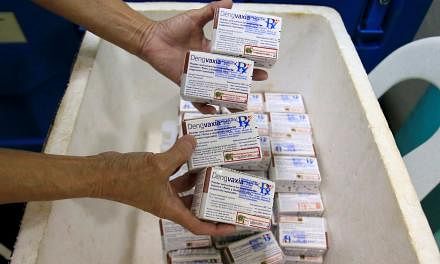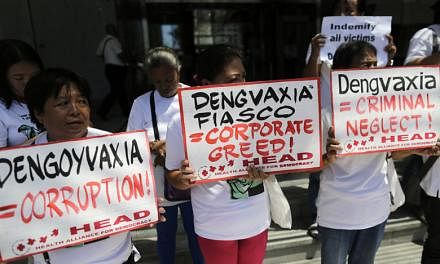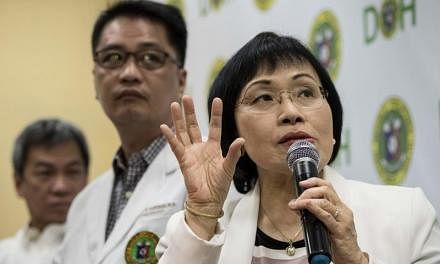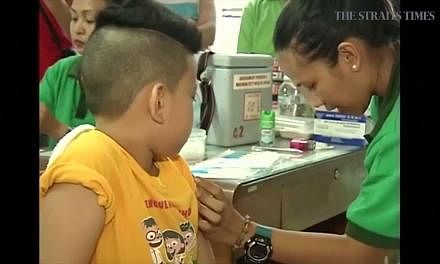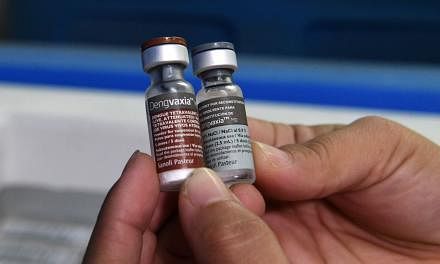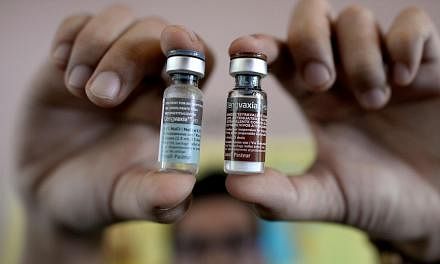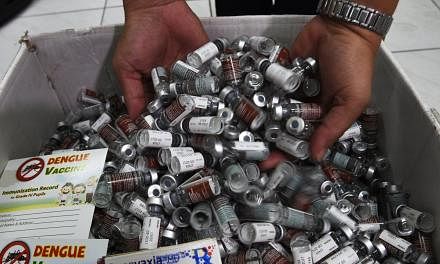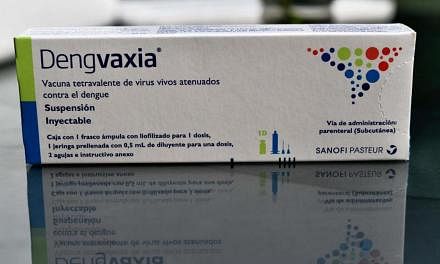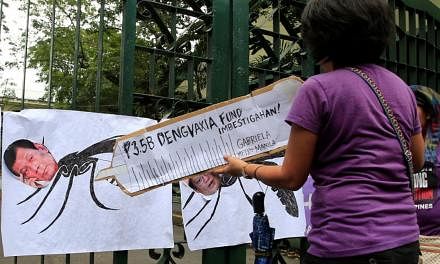MANILA - French pharmaceutical giant Sanofi Pasteur said on Monday (Dec 4) there have been no reported deaths among the over 730,000 children in the Philippines who had received its flagship dengue vaccine Dengvaxia.
"As far as we know, there are no reported deaths related to dengue vaccination," Sanofi medical director Ruby Dizon said at a news briefing.
This comes as the Department of Justice, an anti-corruption group, and a senator pressed for separate investigations into the 3.5 billion-peso (S$94 million) dengue vaccination programme sanctioned by former president Benigno Aquino, following a fresh alert from Sanofi that Dengvaxia could pose health risks in people not previously infected.
The Volunteers Against Crime and Corruption, a staunch supporter of President Rodrigo Duterte, sought to exhume the bodies of three children it claimed died after they were vaccinated in April last year.
Dr Dizon said these deaths were not caused by Dengvaxia.
"Our appeal is if we try to create this misinformation, this will not only have an impact on the dengue vaccination but the government's entire immunisation programme," she told reporters.
Justice Secretary Vitaliano Aguirre, nonetheless, ordered an investigation into whether Dengvaxia may be a "danger to public health", and whether those who cleared its use should be charged.
In a statement on Sunday, presidential spokesman Harry Roque slammed the "public health scam".
Philippine health officials began vaccinating over a million children in April last year with Dengvaxia, amid safety concerns expressed by public health advocates.
Last week, the health department put the programme on hold following the alert.
Dengue is the most widespread mosquito-borne disease in the world, with nearly 400 million people infected every year.
There are four dengue viruses, or serotypes, and most people who are infected recover and become immune to the first serotype they had.
In some cases, a later infection with a different serotype can lead to a severe hemorrhagic fever. About 25,000 people die every year from hemorrhagic fevers arising from the disease.
Sanofi officials on Monday sought to allay concerns over Dengvaxia's use by downplaying the scope of possible infections.
In its alert, Sanofi said further clinical studies had revealed that, in those who had previously had dengue, the vaccine could prevent repeat infection. But for those who had not had dengue, and were vaccinated and later became infected, "more cases of severe disease could occur".
Dr Ng Su Peing, Sanofi's global medical head, said nine in 10 Filipinos will be exposed to the dengue virus by the time they reach adolescence. Two-thirds, however, will not exhibit symptoms of the disease.
She said this means 90 per cent of the population is unlikely to suffer a second, more severe type of dengue if they are vaccinated.
"Severe dengue itself is rare," she said.
Dr Joselito Santa Ana, Sanofi's regional director, said even the small proportion of severe dengue cases are unlikely to lead to "shocks and deaths".
"Let us put this in proper context. What is severe? We think of it as dengue shock. It's not. 'Severe' may just be two days of fever, lower platelet count, hematoma or vomiting," he said.
The World Health Organisation, though, defines "severe dengue" as "a potentially deadly complication due to plasma leaking, fluid accumulation, respiratory distress, severe bleeding, or organ impairment".
Sanofi officials said that overall, Dengvacia has proven to be "safe and effective".
Dr Ng said said Dengvaxia has prevented 65.5 per cent of dengue infections, saved four of five from incurring huge hospital bills, and averted nine in 10 cases of severe dengue.
"We see fewer hospitalisation and fewer cases of severe dengue among those who were vaccinated against those who received a placebo," she said.
Sanofi will continue to monitor all those who had been vaccinated for up to six years from the time the first of the three recommended doses were administered, she said.
General manager Ching Santos said Sanofi has also already advised doctors to avoid prescribing Dengvaxia to patients they know who have not had dengue infections.
Politicians, meanwhile, have started to weigh in on the matter.
Senator Joel Villanueva sought to revive a congressional probe on the dengue vaccination programme to determine whether some health officials should be held responsible "for haphazardly allowing the vaccine to be administered without extensive due diligence on the effects and without waiting for the results of a comprehensive clinical trial".


